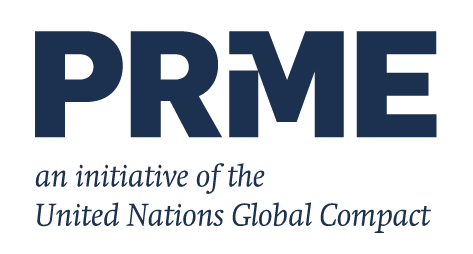PRME
PRME signatory since 2013
The Principles for Responsible Management Education (PRME) is a global initiative launched in 2007 by the United Nations. JIBS has been a PRME signatory since 2013.
PRME builds on the notion that business is an essential part of the world and an essential part of shaping a sustainable future for all. Given that, PRME's mission is to transform management education and develop the responsible decision-makers of tomorrow to advance sustainable development. Six principles assist and inspire business schools to promote sustainability and corporate social responsibility, providing future leaders with the skills needed to balance economic and sustainability goals whilst drawing attention to the Sustainable Development Goals (SDGs). Read more about the six principles here External link, opens in new window..
External link, opens in new window..
By adopting the six principles, JIBS has pledged to participate in a continuous process of developing education, research and dialogue with the business community in questions concerning CSR and sustainability.
JIBS approach to PRME
The work of PRME at JIBS is materialised through its guiding principle to be Responsible in Action. This principle is central to advancing our commitment to educating responsible leaders and becoming role models in our industry.
"One of the guiding principles of Jönköping International Business School is to be responsible in action. Being responsible in action means paying active and honest attention to ethics, responsibility, and sustainability, even when it entails costs and sacrifices regarding short-term rewards. Being responsible in action means educating leaders guided by societal values rather than the maximisation of individual returns. Most importantly, being responsible in action means awareness and reflexiveness and the ability and readiness to act in line with such understanding."
Jerker Moodysson
Dean and Managing Director, JIBS
At JIBS, embedding Responsibility in Action implies adopting a triple bottom line logic in which social, environmental, and economic sustainability converge. How we will work to achieve this can be described by relating Responsible in Action with two dimensions, the individual and collective dimensions of our organisation.
The individual dimension comprises faculty, staff, and students' motivation and behaviour to partake in activities, education or research on ethics, responsibility, or sustainability. Motivation indicates a substantial degree of commitment and engagement of faculty, staff and students towards ethics and responsibility. Behaviour indicates that the faculty, staff and students' competence and knowledge of ethics, responsibility or sustainability permeate their actions, performance and societal impact. It also means that personnel are ethical in different realms of their work lives. The collective dimension encompasses culture and systems to create an ethical and responsible organisation. Culture means that we adopt "Responsible in Action" as a Guiding Principle and that we identify shared practices in our daily activities that help us live this out.
JIBS Systems correspond to the reliance on environmental certification, working environment plans, non-discrimination and equality that support the wellbeing and health of personnel and the overall sustainability of our organisation.
Prize-winning report
As a signatory of PRME, JIBS must regularly submit a report on progress towards the six principles. JIBS received recognition at the United Nations Headquarters in New York in spring 2017 for Advanced Sharing Information Practices on Progress reporting excellence. Read more on the Jönköping University Newspage.
Key documents
- JIBS RIA report 2021
 Pdf, 5.6 MB, opens in new window.
Pdf, 5.6 MB, opens in new window. - JIBS PRME report 2019
 Pdf, 26.5 MB, opens in new window.
Pdf, 26.5 MB, opens in new window. - About the six principles (PRME web site)
 External link, opens in new window.
External link, opens in new window. - JIBS PRME report 2017
 Pdf, 6.6 MB, opens in new window.
Pdf, 6.6 MB, opens in new window. - JIBS PRME report 2015
 Pdf, 5.9 MB, opens in new window.
Pdf, 5.9 MB, opens in new window. - PRME blog about JIBS, May 2015
 External link, opens in new window.
External link, opens in new window.
- Assistant Professor Business Administration
- Jönköping International Business School
- guenola.nonet@ju.se
- +46 36-10 1860


